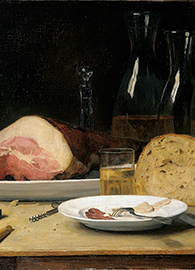Romans Week 10
Communal Obligations: Romans 14:1–15:13
Seattle Pacific University Professor of Dogmatic and Constructive Theology
Read this week’s Scripture: Romans 14:1-15:13
11:06

 EnlargeThe Tendency to Divisiveness
EnlargeThe Tendency to Divisiveness
Christianity has a long history of making small things into big things. Oftentimes the most virulent debates and name-calling within Christianity have been between groups closely related to one another. Stories of churches dividing because of worship styles, the color of the carpet, or the option of either pews or individual chairs are legendary.
In one sense, this isn’t an issue that strikes only the church; really, this tendency to be divisive marks humanity as a whole. Come election year, we witness such tendencies in our political processes. Therefore, the matter rests with people, not with the church per se.
And yet one would think that the church — an entity constituted by those who are “called out” of the world, transformed by the gospel, and sent back into the world as signs of God’s constant and redemptive love — would be significantly different from other human groups. One would think that the church would guide its common life by a higher standard. And oftentimes it does.
But how does a church deal with these kinds of tensions? How are things to be estimated? Who makes the call of what is important, and what happens when the church is evenly and painfully split on an issue? There are no easy answers to these questions. Especially in Protestantism, the strategy of choice has been to break off and start a new congregation or denomination rather than to forgive, seek forgiveness, and reconcile with one another.
Test Case: Dietary Practices
Because these are timeless questions regarding the church’s life, Paul was aware of them. He had a keen sense that Christian unity is fragile, and requires ongoing monitoring and self-assessment. There is no magic formula for the thriving of Christian community, but Paul presents us with a specific scenario as a test case of a sort in order to illustrate how the church is to handle its internal affairs.
At the beginning of Chapter 14, Paul takes up the example of dietary practices. Given the kosher practices of Jews and that this issue had already been addressed in part at the Jerusalem Council of Acts 15 (and it is a theme in 1 Corinthians 8), it seems that dietary practices were an ongoing discussion point for the early Christians.
Paul takes up the issue of meat eaters and vegetarians. There is some flexibility with this issue, since within the law there is no pronouncement regarding vegetarianism — in other words, it seems to be an open matter that simply “could go either way.” And yet Paul finds it necessary to exhort the Roman churches: “Those who eat must not despise those who abstain, and those who abstain must not pass judgment on those who eat; for God has welcomed them” (14:3).
Paul’s Focus: Honor the Lord
What is remarkable is that in this issue, as in so many others, what is an “either way” situation becomes the basis for a “better than thou” regulation. Now isn’t that something?! Little things become big things, and part of the transition includes a specific way of evaluating very important things like integrity, spiritual fullness, and the like. Paul continues:
Let all be fully convinced in their own minds. Those who observe the day, observe it in honor of the Lord. Also those who eat, eat in honor of the Lord, since they give thanks to God, while those who abstain, abstain in honor of the Lord and give thanks to God (14:5–6).
The focus throughout is the desire of these folks who practice these various things to honor the Lord. In these “either way” situations, the point is that people are trying to “work out [their] own salvation with fear and trembling” (Philippians 2:12). They are trying to honor God through their practices, and that is the most important thing in these “either way” scenarios.
Paul puts the matter in life-and-death terms to show the irrelevance of petty matters. We live unto God; we die unto God; either way, our lives are on continual display before God, the One who makes our lives possible. We are to worship God in whatever ways we can, because we are all accountable to God and will be judged by God.
Paul proceeds to engage in a very creative kind of discussion. On the one hand, Paul believes it is important for individuals to develop convictions of their own (“let all be fully convinced in their own minds” (14:5)), but there is a mindfulness for the other that we are to foster with regard to these “either way” practices.
Rather than judging one another for being “too open” or “too closed” on issues, we are to mind one another so that we don’t contribute to one another’s stumbling. We are to help build (rather than to hinder) faith. Paul shares his own views on a subject: In his mind, foods are not ritually unclean in themselves, in their very nature; rather, they retain the status of “unclean” because of the views people have of them.

 Enlarge
Enlarge
But Paul continues with the assumption that this admonition applies to him as well: “If your brother or sister is being injured by what you eat, you are no longer walking in love. Do not let what you eat cause the ruin of one for whom Christ died” (14:15). We are not to make big things out of little things; we are not to judge or cause problems for others when the matters in question can be taken care of by people putting others first.
One way of framing the issues that concern Paul here is the notion of legalism. When legalism is operative in Christian discourse, it usually means attending to a rule or a “shall not” no matter the circumstance. It means allowing practices and observances to be ends unto themselves rather than seeing these practices and observances as indicative of something greater.
A Counterintuitive Notion: Putting the Other First
Moving back to the case above, legalism creeps in when avoiding certain foods or eating everything becomes important on its own terms rather than being a practice that is performed to honor the Lord. For Paul, the law is an expression of, and should be undertaken with, the love of God.
To a certain degree, it is important what we do in our eating practices; but it is also important that we engage in community with a mindfulness that prioritizes the faith of the other. We may not always agree; we may have “grown out of” a certain practice or idea, but we are to be mindful of the other’s faith: “Let us then pursue what makes for peace and for mutual edification. Do not, for the sake of food, destroy the work of God” (14:19–20).
This idea of putting the other first is quite counterintuitive to our sensibilities. We value the individual, and individuals in our society have individual rights; individual tastes and choices are highlighted and respected, and marketing strategies exist to appeal to these.
The common mantra of our public morality is, “Do what you want as long as it doesn’t get in the way of what I want to do.” If these are our values, then what do we do with Paul’s charge? Being mindful of the faith of others and modifying our behavior in light of others’ faith appear anti-modern and oppressive. Whenever something is counterintuitive, the counter-questions arise: How does this really work? Doesn’t this give the power to the other person? How long are we to give in to them? What about our faith — doesn’t it matter, too?
All of these are important questions, but again they assume the priority of the individual throughout. We ought to remember that these admonitions are applicable to everybody, not just to us as we are tolerating others. Now, can we imagine a fellowship that is governed thoroughly by this principle?
It is not as if what Paul is calling for is impossible or anti-biblical; in fact, in Christ’s life we see this principle on full display. For the upbuilding of our faith, Christ sacrificed himself; in the words of the Philippians hymn, the Son “did not regard equality with God as something to be exploited” (Philippians 2:6).
Here in Romans, Paul says much of the same thing when he mentions that Christ did not seek to gratify or please himself but rather endured the insults of others (15:3). This strategy would mean a lot of sacrifice for those who are stronger in their faith, but, again, that is a feature of God’s kingdom: we live for God and others, and not so much for ourselves. Only in such a fashion can we “live in harmony with one another, in accordance with Christ Jesus, so that together [we] may with one voice glorify the God and Father of our Lord Jesus Christ” (15:5–6).
Once again, the issue of Jews and Gentiles living in harmony may be on Paul’s mind as he focuses on these practical matters. With dietary laws being at the forefront of past conflicts between Jewish and Gentile Christians, it is plausible to believe that the Roman congregations could have been facing these same struggles. As Paul has repeatedly said in this epistle, the model for us in all aspects of the faith (including our common life together) is Christ: “Welcome, one another, therefore, just as Christ has welcomed you, for the glory of God” (15:7).
This contextual consideration, however, does not detract from the relevance of what Paul is saying here. In every church community, strife and conflicts happen. Just because we are Christians does not mean that unity will be easy; quite the contrary, unity is a lot of hard, intentional work. If everybody would live self-sacrificially, it would be amazing what things would and would not be prioritized. Even more to the point, such fellowship would be an authentic witness to the gospel’s power to transform and change human nature. Frankly, it would be a wonderful and beautiful glimpse of heaven.
Questions for Further Reflection:
- The Lectio writer notes our human tendency to be divisive, struggling with unity — even in the church. To be sure, there are matters of orthodoxy over which Christians should rightly take a stand (i.e., the divinity of Christ). However, many divisions in the church take place over relatively unimportant struggles. What are some strategies for distinguishing “small things” from “important things”? Once we’ve formed such identifications, how are we in the church to move forward in our pursuit of unity in Christ’s love?
- What divisive issues does Paul specifically address in this text? How does he suggest that the Roman church deal with their differing opinions? From this, what principles of conflict management and Christian charity can we carry into dealing with division in our own church contexts?
- At the heart of many of these communal struggles are issues of humility, graciousness, and self-sacrifice. The Lectio writer notes, “This idea of putting the other first is quite counterintuitive to our sensibilities.” How do these texts challenge your sense of individualism? In what specific ways is God asking you to put the needs of others before your own?
<<Previos Lectio Back to Romans Next Lectio>>

This work is licensed under a Creative Commons License.




